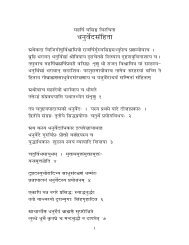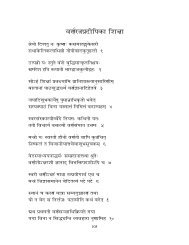Create successful ePaper yourself
Turn your PDF publications into a flip-book with our unique Google optimized e-Paper software.
3.207. The manes are always pleased with offerings made in open, naturally pure places, on the banks of rivers,<br />
and in secluded spots.<br />
$DVQH X S.„{»H X ELK5 P7VX SZ. SZN{ S6SÐ GNDQ V0\J LY¾DV WDQ SYH]\HW<br />
3.208. The (sacrificer) shall make the (invited) Brahmanas, who have duly performed their ablutions, sit down<br />
on separate, prepared seats, on which blades of Kusa grass have been placed.<br />
SYH=\ WX WDQ LY¾DQ $DVQH Y $MXJXL3VWDQ J1[ PD/\(! VXUL L U{ $F5\HG{ G(YS8Y5NP<br />
3.209. Having placed those blameless Brahmanas on their seats, he shall honour them with fragrant garlands<br />
and perfumes, beginning with (those who are invited in honour of) the gods.<br />
WH DP GNP $DQ,\ V SLY¥DV LWODQ $LS $”D( Ne\D5G{ $QX`DWDH ÂDÚ>DH ÂDÚ>(! VK<br />
3.210. Having presented to them water, sesamum grains, and blades of Kusa grass, the Brahmana (sacrificer)<br />
shall offer (oblations) in the sacred fire, after having received permission (to do so) from (all) the Brahmana<br />
(guests) conjointly.<br />
$”H! VDHP \PDB\D F N‰7YD $3\D\QP $DLGW! KLYGD5QHQ LYL[YW SËDW VWS5\HW LSW†Q<br />
3.211. Having first, according to the rule, performed, as a means of protecting (the Sraddha), oblations to Agni,<br />
to Soma, and to Yama, let him afterwards satisfy the manes by a gift of sacrificial food.<br />
$L” $ DYH WX LY¾6\ SD>DY #Y SSDG\HW \DH ÛL”! V L´MDH LY¾(U{ P·GL]5L U{ &\WH<br />
3.212. But if no (sacred) fire (is available), he shall place (the offerings) into the hand of a Brahmana; for<br />
Brahmanas who know the sacred texts declare, ’What fire is, even such is a Brahmana.’<br />
$‘DH[QDQ VX ¾VDGDQ YG17\HWDQ SXUDWQDQ ODHN6\ $3\D\QH \X‹DQ ÍD GHYDQ L´MDH¢PDQ<br />
3.213. They (also) call those first of twice-born men the ancient deities of the funeral sacrifice, free from anger,<br />
easily pleased, employed in making men prosper.<br />
$SV9\P $”D( N‰7YD VY5P $DY7\ LY‘PP $SV9\HQ K6WHQ LQY5SHG{ GN XLY<br />
3.214. After he has performed (the oblations) in the fire, (and) the whole series of ceremonies in such a manner<br />
that they end in the south, let him sprinkle water with his right hand on the spot (where the cakes are to be<br />
placed).<br />
¥,vV WX W6PD¬i KLY!]H DW LS^IDQ N‰7YD VPDLKW! $D(GNHQ #Y LYL[QD LQY5SHG{ GL@>D PXR!<br />
3.215. But having made three cakes out of the remainder of that sacrificial food, he must, concentrating his<br />
mind and turning towards the south, place them on (Kusa grass) exactly in the same manner in which (he<br />
poured out the libations of) water.<br />
1\X3\ LS^IDV WWV WDV WX ¾\WDH LYL[S8Y5NP WH X G H5<br />
X W K6W LQP5-\DW OHS DLJQDP<br />
3.216. Having offered those cakes according to the (prescribed) rule, being pure, let him wipe the same hand<br />
with (the roots of) those blades of Kusa grass for the sake of the (three ancestors) who partake of the wipings<br />
(lepa).



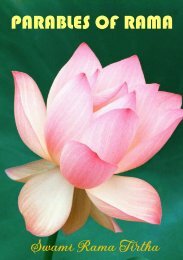
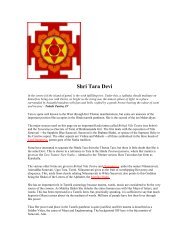
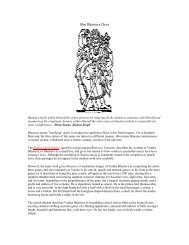
![[ Home ] [ Up ] Books Contact us Immortal Promise ... - Hindu Online](https://img.yumpu.com/9577792/1/190x245/-home-up-books-contact-us-immortal-promise-hindu-online.jpg?quality=85)
